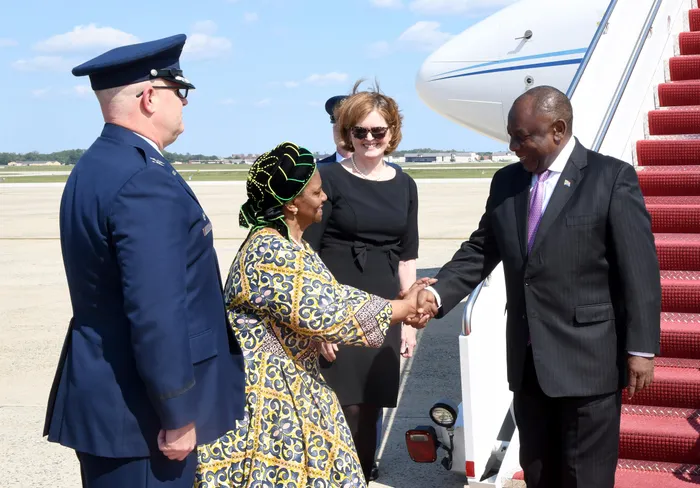SA, US Relations: Ramaphosa, Trump and the Battle for Sovereignty

Then South African Ambassador to the U.S, Nomaindia Mfeketo receiving President Cyril Ramaphosa at Joint Base Andrews Military Airport in Washington DC at the start of a state visit to the United States September 15, 2022. Ramaphosa’s visit to the White House on May 21 to meet President Donald Trump arrives not as an exercise in bilateral normalcy but as a moment of deep historical confrontation, says the writer.
Image: GCIS
Faiez Jacobs
“It is in moments of diplomatic ceremony that history often demands its most radical clarity.”
President Cyril Ramaphosa’s visit to the White House on May 21 to meet President Donald Trump arrives not as an exercise in bilateral normalcy but as a moment of deep historical confrontation. It demands of us not mere diplomacy, but a reassertion of democratic sovereignty, memory, and moral clarity not only for South Africa but for the entire Global South.
While state dinners and press briefings may follow familiar scripts, we must not be fooled. This visit is political theatre with geopolitical stakes. In this theatre, our democratic narrative is under siege.
The Weaponisation of Refugee Politics
The Trump administration’s recent decision to grant refugee status to a select group of white South Africans invoking false claims of racial persecution must be understood for what it is: a deliberate distortion of South Africa’s post-apartheid journey, mobilised as part of America’s grievance-fuelled election cycle. This is not humanitarianism. It is propaganda.
It reframes constitutional redress policies like land reform and employment equity as forms of reverse apartheid. It racialises economic grievances and rebrands privilege as persecution. In doing so, it exports a narrative that delegitimises our sovereign democracy while reinforcing right-wing ideological tropes across the West.
Ramaphosa must defend the historical record
The ANC-led state must not walk into Washington on the defensive. Our president must not apologise for the transformation.Instead, he must recite the record. South Africa remains one of the few nations peacefully transitioning from a racial oligarchy to inclusive democracy.
Our Constitution enshrines non-racialism, social justice, and democratic participation. Land reform, Operation Vulindlela, and social compacts are not forms of revenge; they are vehicles of repair. To undermine these is to invalidate the very idea of restorative democracy.
This is where Ramaphosa must channel both the measured defiance of Oliver Tambo and the pragmatic clarity of Thabo Mbeki. This is not the time to nod politely while we are recast as an unstable post-colonial client. It is time to assert that South Africa is not a failed state; it is a wounded society healing with integrity.
Facing a Techno-populist, Post-Truth White House
Trump is not alone. He will be accompanied formally or ideologically by technocrats like Elon Musk, Peter Thiel, David Sacks, and cultural warriors like J.D. Vance. This circle does not operate within classical diplomacy. They trade in attention, spectacle, misinformation, and power outside the state. Ramaphosa’s team must prepare not only for bilateral talking points but also for ideological ambushes, perhaps even live media provocations.
He must expect:
- White genocide rhetoric,
- Attacks on Mandela’s legacy,
- Mockery of BRICS and anti-Zionist stances; and
- The conflation of Palestine solidarity with extremism.
He must not flinch. He must not be an American point man. This is not only a defence of South Africa. It is a defence of the idea that post-colonial states have the right to transform, the right to dissent, and the right to narrate themselves without Western paternalism.
A New Doctrine for the Global South
This meeting can also be generative. Ramaphosa should use it to table a new democratic doctrine crafted not for applause in Washington but as a rallying cry for sovereign nations across Africa, Asia, and Latin America. This doctrine must affirm:
- Digital and economic sovereignty in the face of data colonialism,
- Equitable trade instead of extractive partnerships,
- Multilateral justice, including reform of the UN Security Council and protection of international courts; and
- The right to self-determine alliances from BRICS to Palestine without Western veto power.
Let Ramaphosa speak not just as South Africa’s president but as a continental statesman, echoing Tambo, Sankara, and Nyerere.
Strategic Unity in Complexity
Here at home, it would be wise for Ramaphosa to be flanked at least in symbolic terms by a unity delegation that crosses political lines. Figures like Roelf Meyer, Ronald Lamola, and even John Steenhuisen, with his constituency in the agricultural sector, can represent our pluralism while reinforcing our shared national interests.
Unity is not uniformity. It recognises that sovereignty is a collective project, not the preserve of any single party.
Speak as a nation, not as a guest
President Ramaphosa must enter the White House, not seeking validation but asserting partnership. He must be the custodian of a national story that refuses to be rewritten in the language of American electioneering.
This is South Africa’s sovereign democracy; it is not perfect, but it's principled, and it is ours.
Let him speak with the wisdom of our past, the courage of our present, and the clarity of our developmental future. In this moment, he not only represents the ANC and the Republic. He represents every society trying to build justice out of a historic rupture.
May he carry us with dignity, principled courage, and pragmatic charm.
* Faiez Jacobs is a former Member of Parliament, strategist, and political analyst.
** The views expressed do not necessarily reflect the views of IOL, Independent Media or The African.
